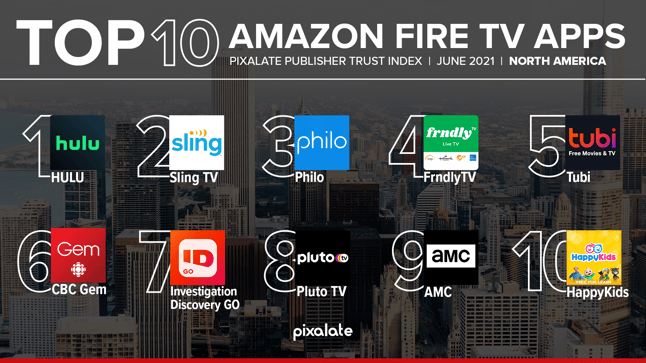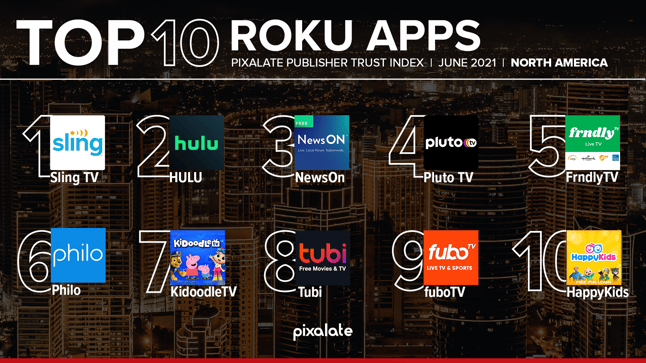


Sling TV and Hulu secured the top spots in the Pixalate’s Publisher Trust Indexes for Roku and Amazon Fire TV, respectively, in June 2021 in North America in Movies & TV category. Both apps were also leading the general category for the CTV platforms.
Sling TV leading Roku ranking
Sling TV dethroned Hulu from the top spot in Roku ranking by an excellent all-around performance. It is the only app from Roku’s classification scoring more than 90 across all measured metrics. In addition, Invalid Traffic (IVT) and Engagement results are worth distinguishing with ratings of 96 and 92, respectively.
Nearly perfect Hulu performance in Amazon Fire TV classification
Hulu remained the leading app in the Amazon Fire TV classification for the second month in a row. It was almost perfect across all measured metrics by scoring the maximum 99 in three of four categories, including Popularity, Ad Density, and Engagement. Moreover, its IVT score was also high, at 96.
HappyKids among the other quality apps
HappyKids jumped in CTV rankings and secured the 10th spot in both Roku and Amazon Fire TV classifications. The app combines popularity with good results in qualitative metrics, especially in Ad Density, where it scored 95 on both platforms.
Find more information about all apps classified in the Publisher Trust Index here for free.
Disclaimer
The content of this blog, and the Publisher Trust Indexes (collectively, the “Indexes”), reflect Pixalate’s opinions with respect to factors that Pixalate believes may be useful to the digital media industry. The Indexes examine programmatic advertising activity on mobile apps and Connected TV (CTV) apps (collectively, the “apps”). As cited in the Indexes and referenced in the Indexes’ key findings reproduced herein, the ratings and rankings in the Indexes are based on a number of metrics (e.g., “Brand Safety”) and Pixalate’s opinions regarding the relative performance of each app publisher with respect to the metrics. The data is derived from buy-side, predominantly open auction, programmatic advertising transactions, as measured by Pixalate. The Indexes examine global advertising activity across North America, EMEA, APAC, and LATAM, respectively, as well as programmatic advertising activity within discrete app categories. Any insights shared are grounded in Pixalate’s proprietary technology and analytics, which Pixalate is continuously evaluating and updating. Any references to outside sources in the Indexes and herein should not be construed as endorsements. Pixalate’s opinions are just that, opinions, which means that they are neither facts nor guarantees; and neither this press release nor the Indexes are intended to impugn the standing or reputation of any person, entity or app.
*By entering your email address and clicking Subscribe, you are agreeing to our Terms of Use and Privacy Policy.
These Stories on CTV
*By entering your email address and clicking Subscribe, you are agreeing to our Terms of Use and Privacy Policy.

Disclaimer: The content of this page reflects Pixalate’s opinions with respect to the factors that Pixalate believes can be useful to the digital media industry. Any proprietary data shared is grounded in Pixalate’s proprietary technology and analytics, which Pixalate is continuously evaluating and updating. Any references to outside sources should not be construed as endorsements. Pixalate’s opinions are just that - opinion, not facts or guarantees.
Per the MRC, “'Fraud' is not intended to represent fraud as defined in various laws, statutes and ordinances or as conventionally used in U.S. Court or other legal proceedings, but rather a custom definition strictly for advertising measurement purposes. Also per the MRC, “‘Invalid Traffic’ is defined generally as traffic that does not meet certain ad serving quality or completeness criteria, or otherwise does not represent legitimate ad traffic that should be included in measurement counts. Among the reasons why ad traffic may be deemed invalid is it is a result of non-human traffic (spiders, bots, etc.), or activity designed to produce fraudulent traffic.”

